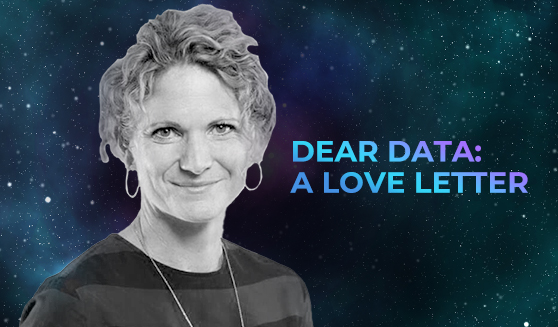
3 Tech sectors facing a talent shortage in 2025
Discover three tech sectors facing a talent shortage this year. Could you find your ideal role in a high-demand sector like cybersecurity, cloud computing, or artificial intelligence?


We’ve been thinking about public perceptions of data since we listened to Eva Fyrberg (Global Head & Ericsson 5G Alliance at KPMG) speak at #LEAP22. She was talking about smart cities, and the data intelligence required to develop city tech that serves its citizens in a positive, useful way.
Fyrberg described some of the ways that technology has improved the citizen experience and safety in cities around the world — from Kuala Lumpur’s multi-hazard platform that gathers and analyses data to predict potential disasters, like weather events and air pollution and major sinkholes; to digital healthcare solutions that were rolled out rapidly in response to the COVID-19 pandemic.
“And all these good things,” Fyrberg said, “it’s very important for cities and for governments and for all of us to communicate that they are based on data, because there is still hesitance among citizens to share data.”
This hit hard. Even made us feel a little protective over data’s reputation. Because it’s true that data is widely reported in mainstream media and public discourse as a scary, bad, invasive thing; while the reality is that data is saving lives and making daily experiences more enjoyable.
Obviously some use cases for data aren’t good. It almost goes without saying, but we’ll say it anyway — data policy is crucial to ensure that personal information is protected, and only distributed with the awareness and consent of the people involved.
When a major data breach hits the news, it goes big. According to research by the Identity Theft Resource Center (ITRC), 2021 was a record year for data breaches, with 1,291 recorded by September 2021 compared to 1,108 for the same time period in 2020.
Among them were an Android data leak in which more than 100 million users were exposed due to misconfigurations of cloud services, leaving sensitive information including names, passwords, payment information, and private chat messages unprotected. And in Iran, over 150 million users of the social messaging app Raychat were affected when a cyberattack exposed and then destroyed their records.
Not only can data breaches on this scale cost billions (the Raychat breach reportedly cost USD $58 billion to resolve), they also carry a deeper cost: public trust in data.
According to Fyrberg, “in the US there’s only 44% actually trusting how their data is used.”
Back in 2019, an ambitious global survey by data supplier Ipsos found that while only one in three adults (35%) have a good idea of how much personal data companies have about them, a large majority across regions expressed significant mistrust about how their data is used. To give the UK as an example (because their views were in line with the global average), 17% were comfortable with foreign governments holding their data, and only 43% were comfortable with their national government holding their data.
They are most comfortable sharing information with brands or companies that are transparent about how they’ll store and use that data — 72% said they’d feel ‘much’ or ‘somewhat’ more comfortable sharing data with a company that provides clear information.
So, as Fyrberg pointed out, there’s “a great improvement potential here and we can do something with that jointly to make people want to share their data.”
The problem is that data breaches and negative uses are talked about a lot. Bad data use is discussed so much in mainstream media that it’s difficult to separate bad use from bad data. Within tech circles, and in certain industries, people love data — but in wider society, if all someone hears is that data has been used badly, then they eventually come to the conclusion that data itself is bad.
Even the countless positive uses of data that are featured in the media on a daily basis — like earlier this year when the city of Chennai used drones to target mosquito hotspots and protect public health — aren’t really good examples because they don’t highlight the role that data played in those positive outcomes. The Times Of India didn’t explain the data intelligence that enabled the deployment of drones to the right locations at the right time for maximum impact.
So there lies the answer: we need to talk clearly and explicitly about good data use outside of tech innovator communities. We need to show people how data is improving their daily lives. How it’s making them safer, healthier, happier. We need to be transparent about what we want to do with data, and how that will increase the life satisfaction of data-givers.
Because if people trust in the use of data for positive change then they’ll be much more likely to share their information willingly; and in turn, tech developers will become more attuned to the needs of their customers. In reference to smart cities specifically, Fyrberg said that tech leaders should “include citizen satisfaction in all business cases going forward,” and we couldn’t agree with this more.
Data, we love you.
From LEAP.

Discover three tech sectors facing a talent shortage this year. Could you find your ideal role in a high-demand sector like cybersecurity, cloud computing, or artificial intelligence?

We’ve gathered advice from tech leaders to help you find your career in tech – so you can get in, stay in, and thrive.

Tan Wooi Leong (Managing Director, Energy and Industrial at Surbana Jurong) says collaboration is critical to drive progress in clean energy transformation. Discover the latest clean energy tech developments this year.

Discover three tech sectors facing a talent shortage this year. Could you find your ideal role in a high-demand sector like cybersecurity, cloud computing, or artificial intelligence?

We’ve gathered advice from tech leaders to help you find your career in tech – so you can get in, stay in, and thrive.

Tan Wooi Leong (Managing Director, Energy and Industrial at Surbana Jurong) says collaboration is critical to drive progress in clean energy transformation. Discover the latest clean energy tech developments this year.